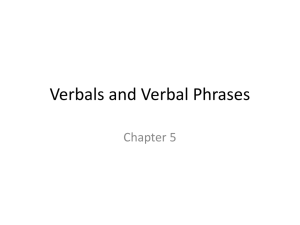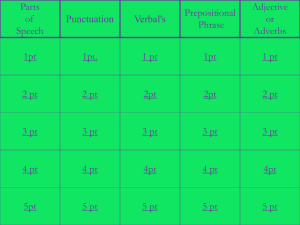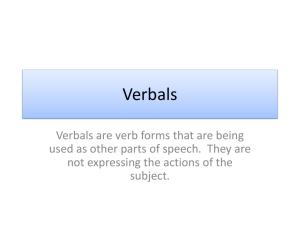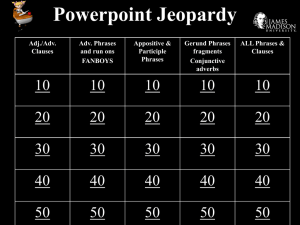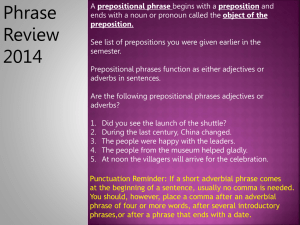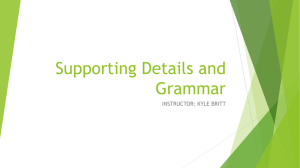Phrases PowerPoint - Stanhope Public School
advertisement
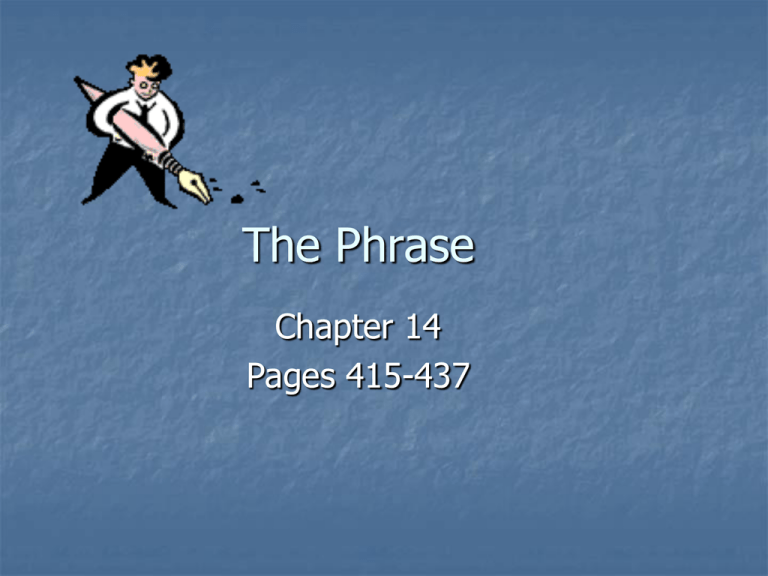
The Phrase Chapter 14 Pages 415-437 What is a Phrase? A phrase is a group of related words that is used as a single part of speech and that does not contain both a verb and its subject. What is a clause? A clause is a group of related words that is used as a single part of speech and that does contain both a verb and its subject. Let’s see, are these phrases or clauses? As soon as the bell rings Around the beautiful, fragrant garden That I really want Any student can join Thinking about tonight’s game To run the marathon Swimming the length of the pool What is a Prepositional Phrase? A prepositional phrase includes a preposition, a noun or a pronoun called the object of the preposition, and any modifiers of that object. There are 2 kinds of prepositional phrases: adjective phrases and adverb phrases Prepositional Phrase Examples The Seine River flows through Paris. The car in front of us slid into an icy snow bank. During the stormy night, the black horse ran off. The dish is filled with raw carrots and celery. What is an Adjective Phrase? A prepositional phrase that modifies a noun or a pronoun is called an adjective phrase. An adjective phrase tells what kind or which one. Adjective Phrase Examples Wang Wei was a talented painter of landscapes. Mrs. O’Meara is the one on the left. What is an Adverb Phrase? A prepositional phrase that modifies a verb, an adjective, or an adverb is called an adverb phrase. An adverb phrase tells how, when, where, why, or to what extent (how long, how many, how much, or how far). Adverb Phrase Examples The sportswriter interviewed the coach before the game. Before the game the team did two laps. Over the weekend, the family went to two different museums. On April 24, 1990, the Hubble Space Telescope was launched into space. What is a Verbal Phrase? A verbal is a verb used as a noun, adjective, or adverb. A verbal phrase consists of the verbal and any complements or modifiers of the verbal. There are 3 types of verbal phrases: participial phrase, gerund phrase, and infinitive phrase. What is the Difference Between a Participle and a Participial Phrase? A participle is a verb form that can be used as an adjective. Present – The smiling child waved. Past – The police officers searched the abandoned warehouse. A participial phrase consists of a participle and any of its complements or modifiers Present - Seeing itself in the mirror, the duck seemed quite bewildered. Past - Broken into hundred of pieces, the mirror was ruined. What’s Being Modified? The trotting horses were not afraid of the crowd. This plate, bought at a flea market, is a valuable antique. Seeing itself in the mirror, the duck seemed quite bewildered. The abandoned house was very spooky. I heard the dog barking loudly. BEWARE! MISPLACED MODIFIERS! A participial phrase should be placed as close as possible to the word it modifies. Otherwise, the phrase may appear to modify another word and the sentence may not make sense. Slithering through the grass, I saw a snake trimming the hedges this morning. Trimming the hedges this morning, I saw a snake slithering through the grass. What’s the Difference Between a Gerund and a Gerund Phrase? A gerund is verb form ending in –ing that is used as a noun. Skiing down that slope was fun. – subject Dad’s favorite pastime is fishing for bass. – predicate nominative We enjoyed hiking. – direct object Give sailing a try. – indirect object Please sweep the sidewalk after mowing. – object of preposition What’s the Difference Between a Gerund and a Gerund Phrase? A gerund phrase consists of a gerund and any modifiers or complements the gerund has. The entire phrase is used as a noun. Having a part-time job may interfere with your schoolwork. – subject The townspeople heard the loud clanging of the fire bell. – direct object We crossed the stream by stepping carefully from stone to stone. – object of preposition BE CAREFUL! Do not confuse a gerund with a present participle used as part of a verb phrase or as an adjective. Pausing, the deer was sniffing the wind before stepping into the meadow. What’s the Function of the Gerund in These Sentences? Typing the paper took an hour. In the past, working took up most people’s time. My sister has always enjoyed riding horseback. I look forward to resting after this tiring job is done. Uncle Eli’s specialty is barbecuing on the grill. Considering the other choices, Melinda decided on walking. Why won’t that dog stop barking? What’s the Function of the Gerund Phrase? The eerie sound they heard was the howling of the wolves. We sat back and enjoyed the slow rocking of the boat. Angelo’s pleading rarely influenced his mother’s decisions. Ants try to protect their colonies from storms by piling up sand against the wind. What’s an Infinitive? An infinitive is a verb form that can be used as a noun, an adjective, or an adverb. Most infinitives begin with to. Wendy really likes to skate. - noun If you want information about computers, that is the magazine to read. - adjective The gymnasts were ready to practice. - adverb WARNING! Don’t confuse an infinitive with a prepositional phrase beginning with to. A prepositional phrase always has an object that is a noun or pronoun. I handed the vase to my mother. An infinitive is a verb form that usually begins with to. She is ready to swim. What’s the Part of Speech? Jen and I like to walk together. – noun We go to my house to listen to music. – adverb To install the fan took two hours. – noun The best time to visit Florida is December through April. – adjective Nunu got up to dance. – adverb He needs a car to drive. – adjective What’s an Infinitive Phrase? An infinitive phrase consists of an infinitive and any modifiers or complements the infinitive has. The entire phrase may be used as a noun, an adjective, or an adverb. The crowd grew quiet to hear the speaker. adverb Peanuts and raisins are good snacks to take on a camping trip. - adjective To lift those weights takes great strength. - noun What’s the Part of Speech? Taking care of your bicycle is one way to make it last. – adjective We used machine oil to lubricate the chain. – adverb I learned to place a small drop of oil on each link. – noun Then Aunt Elsie showed me the valve that is needed to fill the inner tube. – adverb My aunt said not to twist the wrench too hard. – noun I thanked her for taking the time to help me. adjective What’s an Appositive? An appositive is a noun or pronoun placed beside another noun or pronoun to identify or describe it. The cosmonaut Yuri Gagarin was the first person in space. I chose one person, her, to organize the volunteers. OK, What’s an Appositive Phrase? An appositive phrase consists of an appositive and its modifiers Officer Webb, one of the security guards, caught the burglar. Leonardo da Vinci , an Italian painter known for his artworks, was also an architect, engineer, and scientist. What About Commas? Commas are generally used with appositives that refer to proper nouns. Appositives and appositive phrases that are not essential to the meaning of the sentence are set off by commas. Rachel Carson, a biologist and writer, published the book Silent Spring in 1962. My sister, Mary, has red hair. – only one sister If the appositive is essential to the meaning, it is generally not set off by commas. My sister Mary has red hair. – more than one sister Find the Appositives Tacos, one of the most popular Mexican dishes, are served here. My twin, Daniel, rode in the Mardi Gras parade. I’ll have a sandwich, tuna salad on rye bread. Shelley asked everyone where her friend Bianca had gone. They sang the song “I’ve Been Working on the Railroad” over and over all the way down the path.


